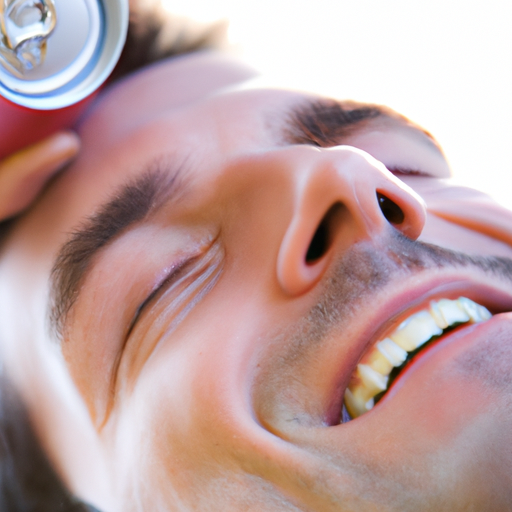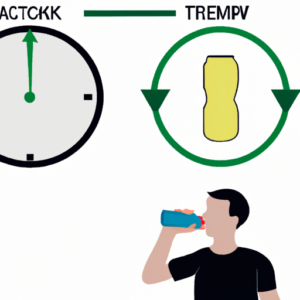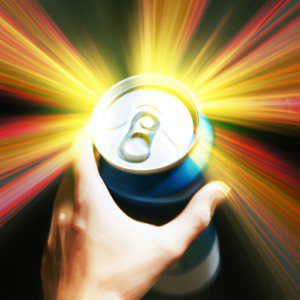The consumption of energy drinks is an increasingly popular behavior, especially among younger generations. While the long-term effects of this practice are still being studied, there is evidence to suggest that these beverages can have a positive effect on mood and mental alertness in the short term.
This article will explore how energy drinks can potentially improve one’s psychological well-being and concentration through various components such as caffeine, taurine, and B vitamins.
The potential advantages of consuming energy drinks have been subject to much research over the past decade due to their increasing prevalence in modern society; however, most studies focus solely on physical health outcomes related to their use.
Nevertheless, some recent clinical trials indicate that ingesting energy drinks might also have beneficial impacts on mental states such as cognitive functioning and emotional stability.
This article will examine existing scientific literature regarding the influence of energy drink ingredients on mood and alertness levels so as to provide a comprehensive understanding of their impact on human psychology.
Caffeine And Mental Alertness
Energy drinks are widely consumed beverages that provide a burst of alertness and energy. They have been used for decades to increase physical activity, mental focus, and productivity levels.
It is well-known that the main ingredient in these beverages is caffeine; however, there has been much debate as to whether or not it improves cognitive performance and increases alertness.
To better understand this relationship between energy drinks and mental alertness, research studies have examined the effects of caffeine on sleep disturbance and physical vigor.
One particular study conducted by University of Georgia researchers found that moderate consumption of caffeine improved reaction time during tests without significantly affecting other indicators such as heart rate or blood pressure. Researchers concluded that those individuals who consume low doses of caffeine may experience increased alertness with no adverse side effects.
The scientific evidence supports the notion that moderate consumption of caffeinated energy drinks can lead to improved mental alertness without causing any negative health effects due to sleep disturbances or physical activity.
The findings from this review suggest that drinking an occasional energy drink may be beneficial when needing an extra boost in concentration or focus.
The Role Of Taurine
Taurine is an amino acid that plays a role in energy drink consumption and its effects on mood and mental alertness. It can be found naturally occurring in some foods such as meat, fish, dairy products, eggs, seeds and nuts. Taurine has been studied extensively for its potential health benefits due to its antioxidant properties.
When consumed through an energy drink, taurine helps improve performance by providing an adrenaline boost which increases blood sugar levels in the body. This increased level of glucose provides more energy for activities such as physical exercise or cognitive tasks. Additionally, taurine may also help reduce fatigue caused from intense activity or stress.
Research suggests that taurine can have positive effects on moods including reducing anxiety, decreasing depression symptoms, improving concentration and increasing overall well-being. Furthermore, it appears to work synergistically with caffeine by prolonging its stimulating effect on mental alertness without overstimulating the central nervous system.
As a result, it has become one of the most popular ingredients used in energy drinks today:
It is clear that taurine plays an important role in contributing to the beneficial effects of consuming energy drinks on mood and mental alertness.
B Vitamins And Cognitive Function
Taurine, a key component in energy drinks, is known for its ability to improve mental alertness and mood. However, another important factor that leads to the positive effects of energy drinks on mental health are B vitamins.
In particular, vitamin B6 and vitamin B12 play an essential role in boosting cognitive function by helping with energy metabolism. Vitamin deficiency can lead to fatigue and lack of focus. This means that if there isn’t enough B vitamins in our system, we may not achieve optimal levels of performance or concentration.
According to research done at the University of Maryland Medical Center, adequate amounts of Vitamin B6 have been shown to increase brain activity and promote better sleep quality which helps us stay focused during the day. On top of this, Vitamin B12 helps maintain healthy nerve cells and red blood cells which increases oxygen flow throughout the body resulting in increased energy level and improved cognition.
Thus it is clear that these two vital vitamins are integral components when it comes to their contribution towards improving mental health outcomes from energy drink consumption. It has become increasingly evident over time that consuming products containing sufficient amounts of both Vitamins B6 and B12 promotes greater levels of mental alertness as well as elevated moods due to their unique metabolic functions within our bodies.
The combination of Taurine along with these two vitamins yields significant improvements in overall psychological functioning; however it is important to note that taking too much supplements can be dangerous so make sure you do your own research before deciding whether or not you should take them regularly or not.
The Pros And Cons Of Energy Drinks
Energy drinks are a popular beverage among adults and adolescents alike due to their stimulant properties that can provide increased alertness, energy, and mood elevation. Although these effects have been studied to some extent, the validity of the potential benefits must be weighed against any associated risks before one decides to include them in their diet.
The pros of consuming energy drinks mainly relate to immediate physical and mental stimulation. These beverages contain various substances such as caffeine, taurine, B-vitamins, guarana extract, ginseng extract, etc., which all work together synergistically to increase focus and mental clarity while providing an energetic boost. Additionally, they can help people stay awake for extended periods of time or improve athletic performance when taken prior to workouts.
However, there are several cons associated with regular consumption of energy drinks. The most commonly reported side effects are gastrointestinal discomfort including upset stomachs and diarrhea. Other issues may arise from increases in blood sugar levels if too many calories are consumed through these drinks without proper exercise or nutrition habits; this could lead to obesity and diabetes over time.
Furthermore, since the majority of energy beverages on the market feature high amounts of caffeine content (upwards of 80 milligrams per serving), it is important not to exceed recommended dosages as excessive intake can cause anxiety and restlessness.
Therefore, individuals should always consider both positive aspects along with adverse ones when deciding whether or not to drink energy beverages – especially those who already suffer from health conditions like heart disease or hypertension which could be exacerbated by its ingredients. When used responsibly within recommended servings sizes according to individual needs and preferences, they can provide short term benefits but long-term use should be monitored closely for any unforeseen consequences arising from sustained ingestion.
Research On The Effects Of Energy Drinks On Mood And Mental Alertness
The potential effects of energy drinks on mood and mental alertness have been studied extensively, with varying results.
A study conducted by Pashko et al. (2019) observed the effect of different levels of caffeine intake on cognitive performance in young adults. Their findings suggest that moderate-level consumption can lead to improved attention and memory, while higher doses may not cause any additional benefit or could even be detrimental to performance.
Other research has examined how certain lifestyle factors interact with the effects of energy drinks on mood and mental alertness.
For example, a study published by Williams et al. (2020) found that individuals who had higher exercise habits reported greater improvements in their mental state after consuming an energy drink as compared to those who exercised less often. Similarly, sleep quality was associated with increased alertness following ingestion of an energy drink; better sleepers experienced more pronounced benefits than people whose sleeping patterns were disrupted or inadequate.
These findings indicate that existing exercise habits and sleep quality might affect the degree to which someone experiences positive changes in mood and alertness from drinking an energy drink.
It is important for researchers to continue studying these relationships in order to develop evidence-based recommendations about best practices for using such beverages responsibly and safely.
Frequently Asked Questions
What Are The Short-Term And Long-Term Side Effects Of Consuming Energy Drinks?
What are the potential consequences of consuming energy drinks?
With their high caffeine content and artificial sweeteners, it is important to consider both short-term and long-term side effects that these beverages may have on mental health.
Short-term side effects can include increased anxiety, insomnia, restlessness, headaches, irritability and rapid heart rate.
Long term use of energy drinks has been linked to an increase in blood pressure as well as other cardiovascular issues. Additionally, there is evidence linking heavy consumption of energy drinks with depression and addiction.
Clearly, it is essential to understand the risks associated with drinking energy drinks before making them a part of your daily routine.
How Many Energy Drinks Should I Consume In A Day To Maintain A Positive Mood?
When discussing the question of how many energy drinks should be consumed in a day to maintain a positive mood, it is important to consider both caffeine intake and overall energy balance.
Generally speaking, research indicates that moderate amounts of caffeine may have beneficial effects on cognitive performance and mental alertness.
However, it is not recommended for individuals to consume more than 400 milligrams (mg) of caffeine per day as this can lead to unwanted side effects such as headaches or difficulty sleeping.
Furthermore, consuming too many energy drinks in one day could cause an imbalance in energy levels which could lead to fatigue and other negative health effects.
Therefore, when considering how many energy drinks are safe to consume daily, moderation is key.
Are There Any Natural Alternatives To Energy Drinks That Can Provide The Same Benefits?
Herbal teas and exercise habits can be natural alternatives to energy drinks in providing the same benefits.
Numerous studies have demonstrated that these two options, when consumed regularly, help improve mood and mental alertness without the use of synthetic stimulants found in many energy drinks.
For example, a study conducted by the University of Cambridge showed that participants who drank herbal tea experienced improved levels of concentration compared to those consuming energy drinks.
Similarly, research published in BMC Public Health revealed that individuals with regular physical activity had better mental health outcomes than those who do not.
It is therefore suggested that including these practices into one’s lifestyle may provide beneficial effects for both physical and mental wellbeing.
Are Energy Drinks Safe For Children To Consume?
The potential risks of energy drinks being consumed by children is a contentious issue, with many voicing their concerns due to the high levels of caffeine they contain.
Reports suggest that excessive consumption may lead to sleep deprivation and even addiction, making it an alarming prospect for those who are still developing.
Research has found that whilst there are some benefits such as improved alertness and mood elevation, these only come at a cost if taken in moderation and under supervision.
Therefore, caution should be exercised when considering giving energy drinks to children.
How Do The Ingredients Of Energy Drinks Interact With Other Medications I Am Taking?
Caffeine, vitamins and other ingredients in energy drinks can interact with certain medications.
The most studied of these interactions is that between caffeine and medications metabolized by the cytochrome P450 enzyme system.
Caffeine may increase or decrease drug levels depending on the specific medication involved, resulting in potentially serious consequences.
In addition to interfering with drug metabolism, some studies have shown an association between heavy consumption of energy drinks and dehydration due to excessive amounts of caffeine found in such beverages.
It is important for those taking medications to consult a physician before consuming any type of energy drink as it could possibly lead to adverse effects when combined with certain types of drugs.
Conclusion
The consumption of energy drinks can have both positive and negative effects on mental health. The short-term side effects include increased alertness, improved mood, and boosted energy levels while the long-term side effects remain largely unknown.
It is important to note that too much caffeine in one’s diet can be detrimental and lead to adverse reactions such as anxiety or insomnia. For those looking for natural alternatives, there are several options available that provide similar benefits without introducing processed ingredients into one’s daily routine.
While children should not consume energy drinks due to their high sugar content and lack of nutritional value, they may benefit from some of their active ingredients when used responsibly. Ultimately, it is best to consult with a physician before consuming any type of dietary supplement so as to ensure optimal physical and mental health.




